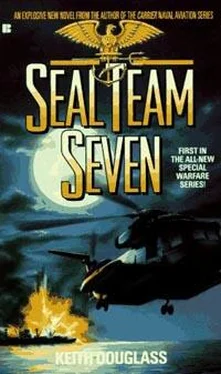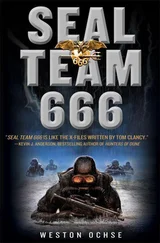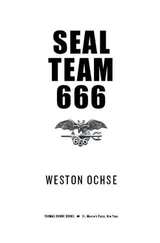Keith Douglass - Seal Team Seven
Здесь есть возможность читать онлайн «Keith Douglass - Seal Team Seven» весь текст электронной книги совершенно бесплатно (целиком полную версию без сокращений). В некоторых случаях можно слушать аудио, скачать через торрент в формате fb2 и присутствует краткое содержание. Жанр: Боевик, на английском языке. Описание произведения, (предисловие) а так же отзывы посетителей доступны на портале библиотеки ЛибКат.
- Название:Seal Team Seven
- Автор:
- Жанр:
- Год:неизвестен
- ISBN:нет данных
- Рейтинг книги:3 / 5. Голосов: 1
-
Избранное:Добавить в избранное
- Отзывы:
-
Ваша оценка:
- 60
- 1
- 2
- 3
- 4
- 5
Seal Team Seven: краткое содержание, описание и аннотация
Предлагаем к чтению аннотацию, описание, краткое содержание или предисловие (зависит от того, что написал сам автор книги «Seal Team Seven»). Если вы не нашли необходимую информацию о книге — напишите в комментариях, мы постараемся отыскать её.
Their cargo includes two tons of weapons-grade plutonium. And now, with enough nuke fuel to arm a superpower, an alliance of fanatics threatens to poison a continent.
In a daring mission of high-seas heroism, Lt. Blake Murdock leads his seven-man unit from Team Seven's Red Squad into bulkhead-to-bulkhead battle — with high-tech
buccaneers who've got nothing left to lose...
Seal Team Seven — читать онлайн бесплатно полную книгу (весь текст) целиком
Ниже представлен текст книги, разбитый по страницам. Система сохранения места последней прочитанной страницы, позволяет с удобством читать онлайн бесплатно книгу «Seal Team Seven», без необходимости каждый раз заново искать на чём Вы остановились. Поставьте закладку, и сможете в любой момент перейти на страницу, на которой закончили чтение.
Интервал:
Закладка:
Aghasi's eyes widened. "Na!" he said, momentarily lapsing back into Farsi. "No! Plutonium itself is dangerous enough!"
Murdock nodded impatiently. "I understand all of that. But is that what this thing is all about? A military coup? A power play by some of your officers?"
"It is more than a power play, Lieutenant. It is a first battle in the war for the soul of my people."
"Okay. So your side gets the plutonium. Your army joins your cause and overthrows the mullahs. Then what?"
"They install a military government in Tehran, under General Ramazani. They... they then have the, how you say, the advantage against our enemies in the region. Iran, Iran's people, will be secure at long last."
Murdock chewed on that for a long moment. He had the feeling that Aghasi was telling the truth as he understood it. He also had the impression, however, that Aghasi was holding quite a bit back. That bit about Iran being secure at last was a bit too pat, a bit too neat. Murdock could think of several other possible outcomes to the scenario Aghasi had just described. Iran's new rulers might decide to launch a preemptive strike on Iraq, for instance, using plutonium-loaded bombs and SCUD warheads. The Iran-Iraq war had not been settled by the armistice of 1988. Far from it, in fact. That war had been only the most recent round in a bloody conflict of rival peoples that went back at least fifteen hundred years. Iraq had provided a safe haven for the NLA, hoping to use it one day to topple the Shiite regime in Tehran. From what he knew of the history of conflict in the region, Murdock doubted that the new ruling clique in Tehran would remain grateful for the help for long. If nothing else, a holy war with apostate Iraq would help unify the Iranian people and take their minds off the inevitable shortages and difficulties brought on by the change of governments.
And there was worse. Operation Blue Sky had been launched because some UN observers had discovered intelligence relating to Iraq's nascent atomic weapons program. What if Iraq was farther along toward an atomic bomb than American intelligence believed? Iran's attack using radioactive dust, possibly even the mere knowledge that they'd acquired the stuff, might be answered by a volley of Iraqi atomic warheads.
Nuclear war at the head of the Persian Gulf could kill more millions, not to mention contaminating half the world's oil supply for generations to come.
"I notice," Murdock said at last, "that you refer to 'them' when you talk about Ramazani's coup, not 'us." What's your part in all of this? Why are you here?"
"I was part of it. I suppose I still am. But... I no longer believe."
"What happened?"
The Iranian shrugged. "Lieutenant, I needn't remind you that my people have suffered a very great deal in the past fifteen years. I am a religious man, but I cannot honor the twisted fanatics who rule my country, who hold it trapped in an earlier century." He brought one long finger up to his head, tapping at his temple. "These eyes have seen the effects of their, their fanaticism. My own son, my Amin, was one of thousands of Iranian children who marched singing into the Iraqi mine-fields and machine-gun cross fires and mustard gas. That was eight years ago. He was thirteen then. It was the mullahs who commanded that the supreme sacrifice must be made, even to the sacrifice of our firstborn in their war against the Iraqi. It was then that I decided that I would do all in my power to fight the mullahs, the dictatorship that grips my nation. But..."
"But?"
The man sagged, and Murdock was aware of something behind those tired, tired eyes, a profound weariness. "I found myself working with fanatics once again, Lieutenant. It seems that I cannot escape them."
"Who? The Ohtori?"
He nodded. "Yes. These are men who... I don't entirely understand this, but I have heard that they believe they will be turned into stars if they die. The Prophet promises the faithful who die in jihad a place in paradise, but these men are, are monsters. You have a saying in your language, the ends justificate the... the..."
"The ends justify the means."
"Precisely so, yes. For these men, any act, no matter how terrible, is justified if it makes success for them in the end. The Ohtori leader who engineered the capture of this sailing vessel was ready to kill everyone aboard, to order my men to abuse the women, even to torture them if it would advance his cause. I spent a great deal of time last night wondering about this, wondering if I was fighting on the right side. On the side of Allah."
"And what did you decide?"
Again an eloquent shrug. "Nothing, Lieutenant, save that there are no easy answers to be found. And then I began to wonder if I was worthy of the martyrdom promised by Allah. That he did not permit me to die this night is, perhaps, an expression of his will."
Murdock pushed back from the table. "Colonel, I don't know about Allah, but I'd say that there's been enough martyrdom for one day."
"Ensha'allah."
Murdock knew that phrase, which could be heard in various related forms throughout the Islamic world. As God wills.
"Tell me, Colonel. What sort of radio schedule were you keeping aboard this vessel? How often were you supposed to check in?"
Aghasi pursed his lips. "There was no schedule, Lieutenant. We were ordered to maintain radio silence. Unless, of course, we came under attack. Then we were to call on a frequency of 440 megahertz, and a patrol boat would close to render assistance."
"And did you get that message off?"
"No, Lieutenant. Your attack was too swift."
Murdock stood. "Thank you, Colonel. You have been most helpful."
"What will become of me?"
"We'll arrange to fly you to one of our ships. Don't worry. You'll be well treated." As he spoke, though, Murdock's mind was racing ahead. If what this Pasdaran colonel had said was true, a startling opportunity existed for the Americans... if they could get their act together in time. Leaving Aghasi in Garcia's care, Murdock hurried from the cabin. He needed to make another radio call to Prairie Home and, through them, to the Pentagon.
1045 hours (Zulu -5 hours)
NAVSPECWARGRU-Two Briefing Room
Little Creek, Virginia
"What is the single element that screws us up time and time again in this sort of op?" Captain Coburn demanded. He looked around the table, moving from face to face. "Intelligence! Or rather, the lack of reliable intelligence. I remind you that the last time we tried to go into Iran, during Operation Eagle's Claw, in 1980, we had no intelligence assets on the ground in that country at all."
"This is hardly a similar situation, Captain Coburn," Admiral Kerrigan said. "Besides, it was mechanical failure that doomed Eagle's Claw, that and the collision of a helicopter with an Air Force transport."
"You're talking through your brass hat, Admiral, and you know it," Brian Hadley said, grinning. "I was at Langley in '80, and I remember. The Company had been out of Iran ever since the Shah got booted out, and we were desperate to have some eyes and ears on the ground. If some young Navy officer had come up with an idea to walk into Tehran and tell us what was going on, I'd have fallen down and kissed his Corfams."
"Hmpf! Has anyone considered that Murdock might be hot-dogging this thing?" Admiral Kerrigan demanded. "Good God, Captain, this whole idea reeks of romanticized John Wayne shit! Spies and traitors and the proverbial cavalry coming over the hill just in the proverbial nick of time!"
"Maybe so, Admiral," Captain Mason admitted from the other side of the table. "But the cavalry, as you put it... or in this case, the II MEF, is going in whether we approve Murdock's plan or not. And it does give us a hell of a lot better chance to pull this off."
Читать дальшеИнтервал:
Закладка:
Похожие книги на «Seal Team Seven»
Представляем Вашему вниманию похожие книги на «Seal Team Seven» списком для выбора. Мы отобрали схожую по названию и смыслу литературу в надежде предоставить читателям больше вариантов отыскать новые, интересные, ещё непрочитанные произведения.
Обсуждение, отзывы о книге «Seal Team Seven» и просто собственные мнения читателей. Оставьте ваши комментарии, напишите, что Вы думаете о произведении, его смысле или главных героях. Укажите что конкретно понравилось, а что нет, и почему Вы так считаете.












